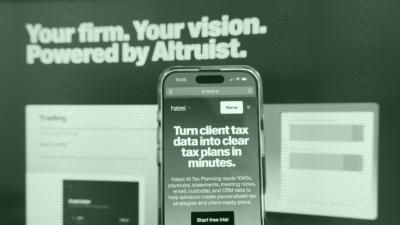Tokens Are the Future. But How Soon Will We Get There?
Outside of some high-net-worth clients’ portfolios, tokenized assets are not yet the norm among advisors.

Sign up for market insights, wealth management practice essentials and industry updates.
When are all the tokens going to get here? It could be a while.
While tokenized assets are expected to be to ETFs what ETFs are to mutual funds, promising cheaper fees, greater transparency and practically instantaneous transactions any hour of the day, they still haven’t become mainstream outside of some high-net-worth portfolios. Today, roughly $30 billion of real-world assets sit on blockchain, which is tiny compared with the $250 trillion global securities market. Advisor adoption of tokens — digital representations of real world assets — is low and several hurdles stand in the way, including a lack of regulatory clarity and potential security risks.
“We’re in the early innings of tokenization, particularly in wealth management,” said Nader Souri, head of corporate banking at BNY. “There will be a positive effect in the future around access, especially to asset classes like real estate or alternatives that are hard to trade today.”
A Better Mouse Trap
Tokens don’t change the basic principles of portfolio construction, and it’s not super important what the technology wrapper around an investment is, Souri told Advisor Upside. “What’s important is the underlying strategy and how it fits in with an end user’s investment guidelines and capacity to take on risk,” he said.
Tokens’ programmability could, however, reshape advisory work. Because they can trade peer-to-peer and execute automatically once certain conditions are met, advisors may find themselves leaning even more heavily toward financial planning over hands-on investment management. “I’m not suggesting that this is the end of advisory services, but that advisors will need to rethink their value proposition,” said Matt Higginson, a partner on McKinsey & Co.’s financial services and risk practices team. “There’s going to be a shift in the activities they do, and there will likely be a shift in the segmentation of the market to whom they provide advice, probably to more self-guided investors.”
Broken Token
For now, there’s just a lot of uncertainty around tokens:
- Custodians, asset managers and wealth firms want clearer rules on how tokenized assets should be classified, supervised and integrated into today’s financial system, Broadridge reported.
- The International Organization of Securities Commissions has also warned that tokenization can amplify existing risks in traditional products and introduce new ones from ties to the crypto market to confusion over whether investors own the underlying asset or merely a token representation.
Plus, ETFs and mutual funds still work extremely well for most clients, leaving advisors little reason to adopt tokens unless the benefits become clear. “If there’s no incremental benefit and the infrastructure is immature, no one is going to go through the additional trouble of getting on the blockchain,” Higginson said.











